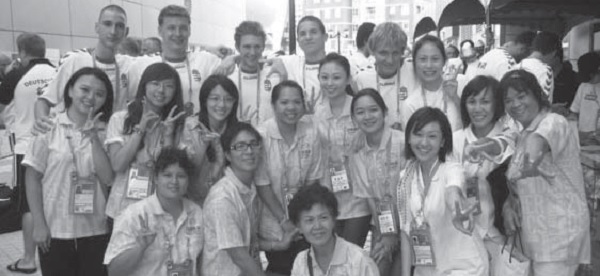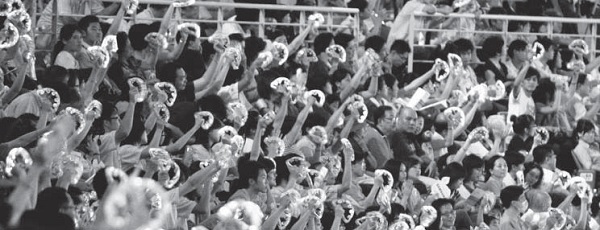Starting from the Taipei Deaflympics
Taking care of the spiritual needs of deaf people

2009年9月5日至15日,臺北聽障奧運的舉辦1,讓臺灣頓時成為國際矚目的焦點,也因著媒體的爭相報導,讓臺灣對聾人文化有了更多了解與認同。
This is the largest international sports event held in Taiwan after the Kaohsiung World Games this year. 4,000 athletes (including 5,500 team members) from 81 countries around the world came to participate in the event. . After three years of planning, more than 9,700 volunteers from schools, social welfare groups, companies or individual volunteers were called upon to serve as sign language, foreign language interpreters, or provide various assistance in professional fields. 22

▲The entire Olympic event is supported by a large number of volunteers. I hope that in the future, all churches will also mobilize their evangelical care for the deaf! (Picture source: Taipei Ming Chuan University website http://www.week.mcu.edu.tw/738/speek.htm)
All mobilization
Indeed, without the need to expand diplomacy and the government's vigorous promotion, Taiwanese society as a whole, especially the prosperous city of Taipei, would not be able to have such a deep understanding of the needs of deaf people. Whether it is the Ministry of Education mobilizing host schools to actively learn sign language; passenger transport operators train hundreds of drivers to learn basic greetings in sign language and prepare paper and pens for emergencies; tourist hotel operators also recruit service staff who understand sign language, and even hotel rooms Equipment, such as doorbells, are equipped with flashing devices to facilitate the entry of deaf players.
Of course, the TV media's propaganda campaign also made the people of Taiwan jump for joy with the entire Olympic Games. At the opening and closing ceremonies, not only big-name stars in the entertainment industry were invited to promote deaf culture (such as the theme song "Audible Dreams" composed and sung by Zhang Huimei), but many exhibitions and performances were also held for deaf art. At the competition site, in order to facilitate communication for deaf people, a large number of video phones were used for the first time and a communication center was set up. Volunteer interpreters could even "talk" to ordinary hearing people.
為了保護這些國際選手的安危,交通上還進行「5不3OK」宣導3,企圖改善臺北人開車快、狠、準卻不顧行人的陋習。政府甚至為他們設定簡訊報警系統,萬一遇到危險,警局隨時待命,以中英文簡訊接收聾人的求救信號。
With the arrival of Tingao, the whole of Taipei seems to be acting as a goodwill and friendship group for deaf people. However, some people cannot help but question whether this wave of enthusiasm will gradually disappear with the closing of the Olympic Games, or will it truly stay in people's hearts and become a cultural driving force, making the entire Taiwanese society pay more attention to and be considerate of disadvantaged groups?
Christian participation
On the other hand, what role did the church play in this major event? What impact does Ting’ao have on the evangelistic activities of Taiwan’s churches?
In fact, throughout the entire Olympic Games planning process, there were many Christians in professional fields who were in the middle of the planning process, such as Brother Sheng Zhiren, CEO of the Olympic Games Organizing Committee and a member of Nangang Enci Church, the opening host Black (Chen Jianzhou), and There are many key players in social welfare groups who quietly do good deeds without anyone noticing.
而此次聽奧會場上的福音行動,卻是由國際聽障宣道團(暫譯,Silent World Ministries International,簡稱SWMI)主席班大衛(David Benette)牧師率領廿四人的團隊飛渡重洋,再邀請國度社區學園傳道會、長老教會博愛手語教會及雙和浸信會等教會配搭4。相較於臺灣社會的全體總動員,臺灣教會對於此事的參與和敏感度相對較低,眾教會真正看見聾人對福音的渴求與需要了嗎?
In fact, large-scale sports events such as the Olympic Games are a good opportunity to spread the gospel! At the 2004 Athens Paralympic Games, many churches and missionary agencies were stationed at the venue, and appointed deaf pastors to be present to pay attention to the spiritual needs of deaf people. In the 1980s, when they learned that their country had won the right to host the Olympic Games, Korean Christians prayed together and asked God to unite them to pray and plan for this rare "World Mission Conference." Christian leaders also put aside their sectarian differences and gathered to discuss evangelical strategies.

▲Taiwanese people dance enthusiastically to the Olympic events! (Image source: Deaflympics official website)
Breaking the "Spiritual Hearing Barrier"
目前臺灣設有聾人事工的教會,只有臺北博愛手語教會、臺北和平東路靈糧堂、臺北真光堂、臺中思恩堂、臺南衛理堂等,這是一塊極待耕耘的福音禾場。5以下拋磚引玉,盼望眾教會起而響應,更多在主裡代禱與連結,探尋出長期、有效且能全體總動員的福音行動策略:
‧Actively train pastoral talents to learn sign language and understand deaf culture and their daily needs.
‧Hold the Disadvantaged Publicity Week every year to educate and enhance general members’ understanding of the deaf. For example: design lesson plans to guide children to experience the pain of being unable to hear, learn sign language poetry, and how to make friends with deaf children appropriately.
‧Organize cross-church gospel ministry for deaf people and share experiences and difficulties in pastoring deaf people.
‧Continuously develop and formulate a set of systematic new faith and edification courses that better meet the needs of deaf people. 66
The Olympic Games will eventually pass, but the real needs of deaf people cannot continue to be ignored. Most of the sign language training sessions held by TingAo are made up of Tzu Chi staff. When will churches be able to get rid of “spiritual hearing barriers” through the power of the Lord? Having heard the cry of deaf people’s lives, I am more obedient to God’s call, giving deaf culture a real source of living water—the great joy of being saved by God!
Notes
1. The official website of the 2009 Taipei Deaflympics http://www.2009deaflympics.org
2. "9,000 Tingao volunteers show their enthusiasm with skillful hands", "China Times", special report by Zeng Wenqi.
3. 5 is not 3 OK means no honking, no overtaking, no speeding, no illegal parking, no impatientness, and zero accidents, zero accidents and zero casualties.
4. "Listen to the Olympic Carnival SWMI coming to Taiwan to preach the gospel", "Kingdom Renaissance News", reported by Tu Huimei in Taipei.
5. "Voices from Twenty-one Million Deaf People", written by Liu Binyuan.
6. "Teaching for Hearing-impaired Believers: Discussion and Suggestions on Implementation Models", Ouyang Zhigang http://www.chinesetheology.com/AY/ImpairedHearingTraining.htm
